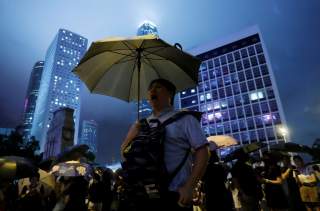History Comes Calling: China Will Soon Decide Hong King's Fate
The world is watching.
Nevertheless, protesters have directed their ire toward the police, demanding investigations into their responses so far. This greatly reduces the chances that police will defect to the protesters' side, while also subjecting the force to a great deal of pressure. The Junior Police Officers' Association has expressed concern about officers' safety, noting that it is exploring "legal action" to protect officers that could disrupt Hong Kong's reliance on local police to contain protests. In such a situation, signs of strain could develop within the police department amid protesters' efforts to coopt them or, more likely, coerce them to uphold their duty less fervently.
The Legislative Council and the Executive Leadership
The pan-democrat camp of the Legislative Council generally supports the protests, but they only hold 25 of the chamber's 70 seats. By contrast, the majority pro-Beijing camp holds 43 seats and has rejected the demonstrators' demands. Crucially, Beijing gets a say in who can serve in the Legislative Council, ensuring that it can preserve its interests — albeit while inflaming tensions in the process, as such privileges already attracted demonstrators' ire during the 2014 Umbrella Movement. Next year's legislative elections will provide another opportunity for that grievance to resurface, but Beijing will ensure that the council remains a political ally that opposes protesters' demands.
Beijing reportedly rejected Lam's resignation earlier this month, implying that it was up to her to clean up the mess that began on her watch. Her resignation would satisfy one of the protesters' key demands, but Beijing is concerned that such a concession would only embolden protesters instead of placating them — leading to demands for freer elections in Hong Kong, which would be intolerable for Beijing. For now, Lam is effectively acting as a firewall between popular unrest and Beijing's control over Hong Kong, suggesting that it is unlikely that she will leave before the 2020 elections. Whoever replaces her, however, will similarly be pro-Beijing given China's ability to mold the council.
The Ultimate Arbiter
At present, the police, Legislative Council and Executive's Office are the only institutions in Hong Kong that unequivocally oppose the protesters. The others either support the protesters or are wavering in their convictions, indicating that demonstrators are retaining broad support, staying on message and maintaining coordination — in spite of their leaderless model. Naturally, the situation is in flux, as the business community could come down against the protesters if it believes that they are endangering Hong Kong's stability. Moreover, increasing violence on the part of protesters could alienate other pillars of the community, especially the religious community.
In the end, Beijing remains the ultimate backstop — one which will not tolerate a protest movement overwhelming the city and turning it completely against the People's Republic of China. That's why, even if all other pillars fall, Beijing retains the right the deploy the People's Liberation Army to instill order. Such a development would be a worst-case scenario that would likely involve waves of arrests affecting a broad cross-section of society and result in the suppression of public gatherings, thereby harming Hong Kong's reputation as a global hub for business — yet it is a move that Beijing would ultimately rely on to prevent an uprising and maintain its territorial integrity. And as more pillars of Hong Kong's establishment fall, the more likely that scenario becomes.
Why the Fate of Hong Kong's Protests Will Come Down to Beijing is republished with the permission of Stratfor Worldview, a geopolitical intelligence and advisory firm.
Image: Reuters

